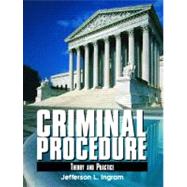
| Introduction to the Criminal Process: History and Overview of Criminal Procedure | |
| Fourth Amendment Standards: Probable Cause to Search, Warrants and Exceptions | |
| Introduction and History: Generally | |
| The Fourth Amendment: Probable Cause to Search | |
| Specificity of Search; Particularity of Description | |
| Requirement of a Warrant | |
| Sources of Probable Cause: The Informant | |
| The Demise of the Two-Pronged Test | |
| Sources of Probable Cause: Police Officers and Others | |
| The Affidavit for a Warrant | |
| The Search Warrant: A Court Order | |
| The Search Warrant: The Time of Execution | |
| Fourth Amendment Requirement: Knock and Announce | |
| Scope of Search | |
| Stale Probable Cause | |
| Warrant Not Always Required for Searches | |
| Suspicionless Searches of Private and Government Employees | |
| Warrantless and Suspicionless Searches at Schools | |
| Warrantless Searches of Political Candidates Rejected | |
| Stop and Frisk: The Legal Standards | |
| Introduction to Stop and Frisk | |
| Stop and Frisk | |
| The Terry Legal Standard | |
| Facts Indicating Unusual Conduct | |
| Facts upon Seeing an Officer as Unusual Conduct | |
| Frisk May Not Always Allow Additional Search | |
| Terry Stops under a Drug Courier Profile | |
| Subject Must Be Aware of Officer's Status | |
| Officer Must Have Reason to Believe that the Person May Be Armed and Dangerous | |
| Investigation Must Not Dispel the Fear that the Subject May Be Armed and Dangerous | |
| The Plain Feel Doctrine | |
| Expansion of Terry to Individuals not under Suspicion | |
| Arrest and Seizure of the Person | |
| Probable Cause Arrests: The Legal Standard | |
| The Concept of Probable Cause for Arrest | |
| Plain Meaning of the Fourth Amendment | |
| Probable Cause Defined | |
| Sources of Probable Cause to Arrest | |
| Stale Probable Cause | |
| Arrest Pursuant to a Warrant | |
| Requirements for Arrest without a Warrant | |
| Requirements for Arrests within the Home | |
| Requirements for Arrests within a Third Party's Home | |
| Fourth Amendment Searches and Seizures: Houses, Persons, Motor Vehicles and Effects | |
| Searches of Houses | |
| Warrant to Search and Arrest Inside the Home | |
| Modern Technology and Warrantless Home Searches | |
| Search Incident to Arrest | |
| Searches of Motor Vehicles | |
| Vehicle Searches Generally Do Not Require Warrants | |
| Limited Vehicle Searches on Less than Probable Cause | |
| Vehicle Inventory Searches | |
| Scope of Motor Vehicle Search | |
| Scope of Search of Containers within Motor Vehicles | |
| Other Theories of Vehicle Searches and Seizures | |
| Searches Following Vehicle Forfeitures | |
| Searches Based on Consent | |
| Requirements for the Plain View Doctrine | |
| Inadvertent Discovery: No Longer Required | |
| Officer Needs to be Lawfully Present | |
| The Plain Feel Doctrine | |
| Special Problem Searches: Administrative, Inventory, School, Work, Airport, and Border searches | |
| Introduction to Administrative, Inventory, School, Airport, and Work Searches | |
| Administrative Searches | |
| Administrative Searches of Ordinary Businesses and Industries | |
| Administrative Searches of Closely Regulated Industries | |
| Ordinary Commercial Search: Warrant Required | |
| Administrative Searches of Homes: No Warrant Originally Required | |
| A Change in Requirements: Searches of Private Premises Require Warrants | |
| Administrative Searches: Reasonable under the Fourth Amendment | |
| Inventory Searches: Probable Cause not Required | |
| Vehicle Inventory Searches | |
| Inventory Searches of Motor Vehicles: Written Policy Required | |
| Inventory Searches of Personal Property | |
| School Searches Must Be Based on Fourth Amendment Reasonableness | |
| Public School Drug Testing: An Extension of Acton | |
| Government Searches in the Workplace | |
| Government Mandated Private Employer Searches | |
| Airport Searches | |
| Border Searches | |
| Border Search Sum | |
| Table of Contents provided by Publisher. All Rights Reserved. |
The New copy of this book will include any supplemental materials advertised. Please check the title of the book to determine if it should include any access cards, study guides, lab manuals, CDs, etc.
The Used, Rental and eBook copies of this book are not guaranteed to include any supplemental materials. Typically, only the book itself is included. This is true even if the title states it includes any access cards, study guides, lab manuals, CDs, etc.